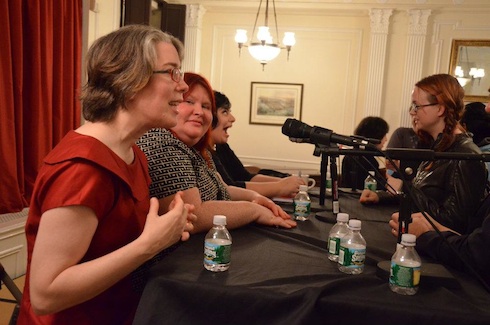Last night, the Center for Fiction’s Big Read continued its month-long celebration of science fiction and fantasy with a panel discussion on the state of YA fiction in the post-Harry Potter world. (Our coverage is collected here.) SFF YA authors Holly Black, Cassandra Clare, Justine Larbalestier, and Chris Moriarty were on hand for the talk, with Delia Sherman serving as the moderator. While the lively group touched on a variety of subjects ranging from their childhood fantastical YA influence to the commercial viability of certain kinds of magical stories, one topic discussed early on was particularly poignant: Magic Schools.
With a magical school at the center of the Harry Potter narrative and of course, Ursula K. Le Guin’s Wizard of Earthsea, begs the question: what’s with all these magical schools, and besides instructing the characters in the ways of magic, what are they good for?
While every member of the panel praised the Potter books, Justine Larbalestier was quick to point out that almost no fantasy element of those books was particularly new, specifically the idea of a magical school. Indeed, Black, and Clare also mentioned that they consistently receive e-mails from accusing them of “ripping off” something from J.K. Rowling, when in fact the fantasy concept was much, much older. (Griffins were just one example!) Clare thinks that this comes from the fact that most readers view Harry Potter as a “canonical” fantasy experience, while people who are interested in the genre don’t. Chris Moriarty agreed with this but felt grateful for the existence of Potter, as it seemed to make publishers hungry for the kinds of stories authors like Moriarty and the panel wanted to tell.
Early on in the discussion Delia Sherman had asked the panel their various inspirations as young people, and a lot of very famous fantasy YA and middle-grade books were mentioned. (Jane Yolen was in the audience, so the mention of her books was particularly touching.) Both Holly Black and Justine Larbaliestier noted that YA and middle grade books like the British Malory Towers series seem to somehow make the experience of boarding school seem “amazing.” The ideas of house points, and midnight feasts, which have now been appropriated by J.K. Rowling for Hogwarts might come from there. This panel wasn’t the first to point out the style and structure of the early Potter books also resembles Tom Brown’s School Days, which is a book that is exactly what it sounds like it’s about; Tom Brown at school.
But why magical schools? Both Larbaliestier and Moriarty seem very interested in putting characters—who are similar to the young people reading the books—in the center of the story. This is certainly true of Holly Black’s Spiderwick books, and here it seems the value of the magical school is clear. In the Earthsea books there’s Roke Island, Jane Yolen gave us Wizard’s Hall (in Wizard’s Hall), Terry Pratchett has The Unseen University in the Discworld series, Diana Wynne Jones has the Chrestomanci Castle in Charmed Life, and several, several more examples, many of which this panel of authors could have rattled off in their sleep!
Did J.K. Rowling rip-off all of these authors with the creation of Hogwarts? Maybe, maybe not. Either way, the concept of a magical school seems to solve a lot of narrative problems for the author of YA or middle grade fantasy novel. First, it accomplishes what Justine Larbalestier and Holly Black were talking about, by putting the younger characters, “in the center of the action.” Second, it plays upon the notion that going away to a boarding school, where one has midnight feasts and plays strange sports, is somehow inherently fun. Finally, it contextualizes the learning of magic in a way that makes it viable not only for the universe of the story, but also for the young reader, who also wants to learn magic themselves.
[The Big Read continues at the Center for Fiction all month. You can find a schedule of all events here.]
You can find more photos from the evening here.
Ryan Britt is the staff writer for Tor.com.










